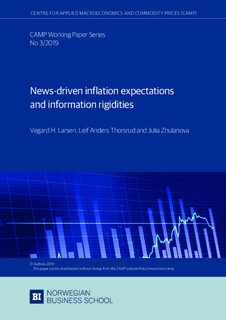News-driven inflation expectations and information rigidities
| dc.contributor.author | Larsen, Vegard H. | |
| dc.contributor.author | Thorsrud, Leif Anders | |
| dc.contributor.author | Zhulanova, Julia | |
| dc.date.accessioned | 2019-05-20T13:01:00Z | |
| dc.date.available | 2019-05-20T13:01:00Z | |
| dc.date.issued | 2019-04-23 | |
| dc.identifier.issn | 1892-2198 | |
| dc.identifier.uri | http://hdl.handle.net/11250/2598089 | |
| dc.description.abstract | We investigate the role played by the media in the expectations formation process of households. Using a news-topic-based approach we show that news types the media choose to report on, e.g., (Internet) technology, health, and politics, are good predictors of households' stated inflation expectations. In turn, in a noisy information model setting, augmented with a simple media channel, we document that the underlying time series properties of relevant news topics explain the timevarying information rigidity among households. As such, we not only provide a novel estimate showing the degree to which information rigidities among households vary across time, but also provide, using a large news corpus and machine learning algorithms, robust and new evidence highlighting the role of the media for understanding inflation expectations and information rigidities. | nb_NO |
| dc.language.iso | eng | nb_NO |
| dc.publisher | BI Norwegian Business School | nb_NO |
| dc.relation.ispartofseries | CAMP Working Paper Series;03/2019 | |
| dc.subject | expectations | nb_NO |
| dc.subject | media | nb_NO |
| dc.subject | machine learning | nb_NO |
| dc.subject | inflation | nb_NO |
| dc.title | News-driven inflation expectations and information rigidities | nb_NO |
| dc.type | Working paper | nb_NO |
| dc.source.pagenumber | 76 | nb_NO |
Tilhørende fil(er)
Denne innførselen finnes i følgende samling(er)
-
Centre for Applied Macro- and Petroleum economics (CAMP) [130]
Working Papers from Centre for Applied Macro- and Petroleum economics (CAMP)
